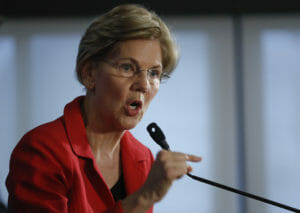How the FCC Can Take the Money Out of Politics
Politics has become a game of the super rich, but the money they donate is significant only because of the way it is spent: on TV and radio advertising.
Big money has always been a problem in American politics, but now humongous money threatens to capsize the ship of state. Billionaires are very, very good at getting rich, mostly through stealth monopolies, relatively sure things (e.g., casinos) or through riding investment bubbles. But they are seldom scientists, physicians or educators, and can often entertain rather cranky beliefs, such as climate change denial or misogyny. Thus, the GOP super wealthy, having produced the tea party in 2010, have now given us national candidates so extreme that they often seem to be running for Supreme Leader of Iran instead of president of the United States. Although the Citizens United ruling of the Supreme Court contributed to this problem, the culprits here are, fundamentally, the length of U.S. campaigns and the cost of television advertising for them.
Ari Berman has shown that about four-fifths of the money raised by super PACs in 2011 for the Republican primary contests was donated by only 196 individuals, who gave $100,000 or more each. Politics has become a game of the super rich, but the money they donate is significant only because of the way it is spent. An increasingly large percentage of it pays for television and radio commercials, and it is used by our new aristocracy to keep pet candidates alive. Newt Gingrich, for instance, might not have made it to South Carolina, where he won, without the backing of a single individual, casino magnate Sheldon Adelson, owner of the Venetian in Las Vegas.
In the 2008 campaign year, about $2.8 billion was spent on television campaign spots nationwide, and the figure is expected to be much larger this time. Although television advertising is not always decisive, politicians can’t afford to bet that it won’t be. Mitt Romney spent $15 million in negative advertising against Gingrich in the Florida primary, which arguably blunted Gingrich’s momentum coming off his South Carolina win. Why should private broadcasters, licensed by the U.S. government in preference of other possible licensees, have been allowed to make massive profits off a public political campaign?
As early as the Iowa campaign, Gingrich began complaining about super PAC-funded television advertisements he said were spreading falsehoods about him on behalf of Romney. Romney responded, “Could I come out and speak about ads, generally, and speak about positive ads and negative ads? Of course, that’s available to everybody. But I’m not in any way coordinating the ads or the approach that’s taken by the super PAC.” Gingrich replied scornfully, “It tells you a lot about Governor Romney … I’m happy to go all over Iowa and point out that he doesn’t mind hiding out behind millions of dollars of negative ads, but he doesn’t want to defend them. The ads are false.”
Would the Florida electoral contest, for instance, have yielded more light and less heat if each candidate had been apportioned airtime based on an equitable formula? Might not Jon Huntsman or Tim Pawlenty have been able to stay in the race and perhaps overcome initial handicaps if they had been able to advertise for free? We are choosing our presidential candidates the way we choose our favorite television shows, by which one generates the most advertising revenue for the broadcaster. Is that really what the founding generation of Americans had in mind?
The Federal Communications Commission should forbid television broadcasters from charging for campaign ads, and we, the public, should peacefully demonstrate outside the FCC offices at 445 12th Street SW, in Washington, D.C., until it does so.
Like the water or the air, the spectrum over which broadcasters transmit their wares is a finite resource that everyone depends on, and which needs to be regulated by government to prevent chaos and hoarding. But in licensing some corporations to dominate the airwaves, Congress inevitably excluded others. I can’t start a radio broadcast from my home because it would interfere with licensed stations. Because choosing some voices over others is inherently unfair, Congress in the Radio Act of 1927 and the Communications Act of 1934 established a general requirement that broadcasters act in the “public interest, convenience and necessity.” This conception of broadcasters as public trustees has been repeatedly upheld by the Supreme Court. The FCC could easily invoke this requirement to demand that campaign commercials be aired gratis.
Moreover, why do electoral campaigns have to last so long? Most democratic countries with a parliamentary system manage to pull them off in about three weeks. Romney announced his candidacy 19 months ahead of the election. Why have rolling state primaries for months on end? Surely it would be possible to have a short campaign season, beginning a month before the primaries, which could be held the same day nationwide. The FCC could also regulate the free ads so that they could be placed only during that month. We don’t vote state by state in the presidential election, so why should we do so in primaries for a national party candidate? The length of the campaign creates the need for big money as surely as the television commercials do. Again, a Huntsman or a Pawlenty, both more likely to do well in a general election than any of the current Republican marathon survivors, couldn’t have been knocked out so easily in a short campaign (their main problem was that they ran out of money).
Repealing Citizens United may be a long and difficult struggle, though a necessary one. But reducing the salience of humongous money in campaigns could be tackled to begin with in these other ways. What is clear is that America is less democratic by the minute, and that bad public policy is being promoted as a result of the dominance of politics by a handful of individuals and corporations. When we hear Republican candidates deny climate change as a result of the massive amounts of carbon dioxide and soot we are putting into the air, we know their ventriloquist is Big Oil. The climate scientists are being outshouted and marginalized by a very wealthy, very small group, and as a result the U.S. is endangering itself and the entire globe.
James Madison, a key shaper of the U.S. system, believed that on any important issue there would be more than one faction in the body politic who would contend with one another until a compromise was reached. He also assumed that despite inequalities of resources, there would be sufficient controversy about legislation that extreme positions would be moderated. But when we have 400 billionaires buying our elections, it is perfectly possible for a handful of cranks to deeply influence the outcome and then to dictate policy positions to their clients, the winning politicians. The moderating influence of the broad electorate has been vitiated. That dynamic has produced what many puzzled voters have termed the Republican “clown car” in this election season. The democratic bargain struck by the founding generation, whereby we all have a chance to influence our country’s destiny, is in danger of being undone, with unimaginable consequences. Occupy the FCC.
Your support matters…Independent journalism is under threat and overshadowed by heavily funded mainstream media.
You can help level the playing field. Become a member.
Your tax-deductible contribution keeps us digging beneath the headlines to give you thought-provoking, investigative reporting and analysis that unearths what's really happening- without compromise.
Give today to support our courageous, independent journalists.




You need to be a supporter to comment.
There are currently no responses to this article.
Be the first to respond.